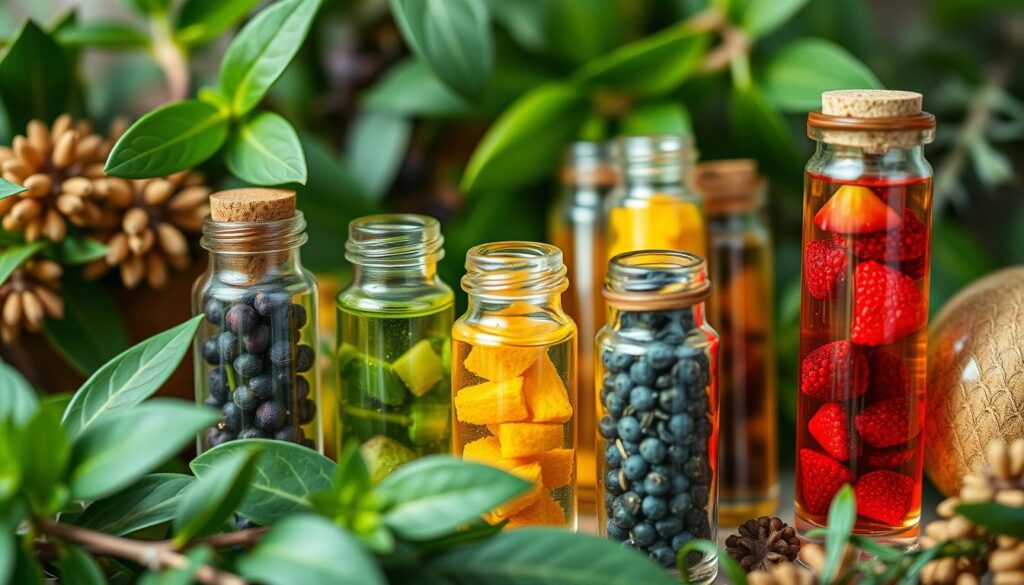Aromatherapy uses plant-based essential oils for health benefits. It’s become more popular as people look for natural wellness options. But, research on essential oils is still mixed, showing we need more studies.
Essential oils are strong plant extracts, often made by steam distillation or cold pressing. They can affect our bodies and minds, mainly when we breathe them in or apply them to our skin. When we inhale essential oils, their molecules reach our brain’s emotional center, the amygdala.
Studies suggest some essential oils, like lavender, lemongrass, and tea tree, have antibacterial, anti-inflammatory, and mood-changing effects. They might help with Lyme disease, acne, and hair loss. Aromatherapy also seems to reduce anxiety, improve sleep, and tackle other health issues.
Key Takeaways:
- Essential oils are highly concentrated plant extracts with potential therapeutic benefits.
- Research on the efficacy of essential oils and aromatherapy has produced mixed results, requiring further scientific investigation.
- Inhalation of essential oils can impact the brain’s emotional center, the amygdala, through the olfactory system.
- Some essential oils have shown promising results in treating conditions like Lyme disease, acne, and hair loss.
- Aromatherapy has demonstrated potential in reducing anxiety, improving sleep, and managing various health concerns.
Understanding the Foundations of Aromatherapy
Aromatherapy uses essential oils for healing and wellness. It has a long history, dating back thousands of years. Ancient civilizations like Sumer, Babylon, and Egypt used these oils for health.
Historical Origins and Development
In 1937, French chemist Rene Maurice Gattefosse coined the term “aromatherapy.” He studied how essential oils heal. Since then, it has grown into a recognized therapy, backed by science.
Modern Applications in Wellness
Today, aromatherapy is accepted in healthcare. It’s used to help patients feel better and less anxious. Essential oils help with stress, sleep, and mood.
Key Components of Aromatherapy Practice
Aromatherapy uses essential oils, carrier oils, and different ways to apply them. Brands focus on pure oils and fair sourcing. They are open about how they make and test their oils.
| Essential Oil | Therapeutic Purpose |
|---|---|
| Lavender | Relaxation and sleep improvement |
| Peppermint | Invigoration and potential headache relief |
| Lemon and Orange | Mood elevation |
It’s important to use essential oils safely. A 1-3% dilution is recommended for skin use. Aromatherapy helps with Alzheimer’s and dementia, and is used in healthcare.

What Are Essential Oils and How Are They Produced
Essential oils are very concentrated plant extracts. They contain volatile compounds. These oils are made by steam distillation or cold pressing. It takes a lot of plant material to make just one bottle.
The quality of essential oils can vary a lot. Some are diluted or mixed with other things. This can change their true nature.
To keep essential oils pure, store them in dark glass containers. This protects them from light and heat. Good companies will tell you the plant names and how they were made.
Essential oils are getting more popular in aromatherapy and wellness. But, they are not medicines. They should be used carefully. More studies are needed to know how safe and useful they are.

“Essential oils are not harmless, and misuse can cause harm if not used as intended.”
Aromatherapists are not doctors. So, always get advice before using essential oils for health issues. Be careful of companies making big health claims. More research and careful use are key to understanding essential oils.
The Science Behind Aromatherapy: How It Affects the Brain
Aromatherapy is fascinating because it changes how we feel and think. It does this by using smells to connect with our brain. When we smell certain scents, it can change our mood and how we see things.
Olfactory System and Neural Pathways
The sense of smell is special because it goes straight to the brain’s emotional center. When we smell essential oils, our nose sends signals to the brain. This happens fast, which is why smells can affect us so deeply.
Impact on the Amygdala and Emotions
The amygdala is key in how we feel emotions. Aromatherapy can change how the amygdala works. Studies show that smells like lavender and bergamot can make us feel less anxious and happier.
Neurochemical Responses to Aromatic Compounds
Aromatherapy also changes the brain’s chemicals that control mood and energy. For example, lavender oil can make us feel calmer by increasing serotonin. Citrus smells can make us feel more awake by releasing norepinephrine. Also, oils like chamomile and frankincense can lower stress hormones, helping us relax.
The way smells, emotions, and brain chemicals work together shows how powerful aromatherapy is. It can help us feel better, less stressed, and more balanced. By using scents, we can improve our mood and well-being.
Clinical Research and Scientific Evidence
The rise in aromatherapy has led to more evidence-based studies and clinical trials. These studies aim to understand its benefits. Some research shows positive effects, especially in reducing anxiety, stress, and improving sleep, especially for cancer patients.
The American Association of Nurse Practitioners found that essential oils can lower patient anxiety. But, more placebo-controlled studies are needed to prove its effectiveness for serious health issues.
Currently, science says aromatherapy might help, but it can’t cure diseases or replace traditional medicine. The lack of regulation in the field makes it hard to ensure the quality of essential oils.
“Aromatherapy is recognized as a fast-growing complementary therapy worldwide, but more research is needed to fully understand its clinical applications and limitations.”
The aromatherapy market is booming, with Americans spending over $30.2 billion a year. The need for solid, evidence-based research will keep growing. It’s important to view aromatherapy with a balanced and scientific mindset, recognizing both its benefits and limitations.
Essential Oil Properties and Their Therapeutic Uses
Essential oils have many health benefits. They can fight bacteria and reduce inflammation. They also help change our mood, offering a natural way to feel better.
Antibacterial and Antimicrobial Effects
Tea tree oil is great for fighting bacteria and fungi. It’s good for acne, athlete’s foot, and other skin problems. Studies show it’s a natural alternative to harsh acne treatments, with fewer side effects.
Anti-inflammatory Properties
Lavender oil helps us relax and sleep better. It can lower anxiety and improve sleep. It takes 250 pounds of lavender flowers to make just 1 pound of essential oil, showing how potent it is.
Mood-Altering Capabilities
Peppermint oil can help with IBS and headaches. Citrus oils mixed with Dead Sea salts fight bacteria like listeria and E. coli. They’re good for keeping things clean. Oils like thyme, rosemary, and cedarwood can even help with hair loss and growth.
“Essential oils show many health benefits, from fighting bacteria to improving mood. They offer a natural way to stay healthy, often better than traditional treatments.”
Safety Considerations and Application Methods
Using essential oils safely is key. These strong plant extracts need to be mixed with carrier oils to avoid skin problems. Experts say mixing them in 1 to 5 percent is usually safe.
When using essential oils on kids, like babies and toddlers, be extra careful. Their skin is very sensitive. For them, the safe mix is 0.5 to 2.5 percent. Older people might also need less oil because their skin can be more sensitive.
Some oils, like bay and cinnamon, need extra care because they can cause problems. To safely use them, mix 6 drops of oil with 1 ounce of carrier oil. This makes a 1 percent mix.
Pregnant women should be careful with essential oils too. Some oils might not be safe for the baby. Safe oils for pregnant women include benzoin and lavender, but avoid others like wormwood.
Essential oils can sometimes cause issues, like skin irritation or sensitivity to sunlight. Always talk to a professional before using them. This ensures you’re using them safely and right.
“Essential oils are powerful plant extracts, and their use requires careful consideration and guidance to ensure safe and effective application.”
The Role of Aromatherapy in Stress Management
Aromatherapy is a promising method for managing stress. Studies show that certain essential oils, like lavender, can lower anxiety and cortisol levels. This helps reduce the negative effects of stress on our health.
Anxiety Reduction Studies
Many studies have looked into how aromatherapy can reduce anxiety. A review of 27 studies found that essential oils like lavender, citrus, and rose help lower anxiety in patients. A study with 81 adults showed that lavender aroma significantly reduced stress levels.
Stress Response Mechanisms
The science behind aromatherapy’s stress relief is fascinating. When we smell essential oils, they interact with our brain’s emotional center. This can lead to the release of happy hormones and lower stress hormones.
Aromatherapy could be a valuable tool for managing stress. It uses scent to help people find natural relief from anxiety and stress. This can improve their overall well-being and quality of life.
| Essential Oil | Key Benefits for Stress Management |
|---|---|
| Lavender | Reduces anxiety, lowers cortisol levels, promotes relaxation |
| Chamomile | Calms the mind, alleviates depression, enhances sleep quality |
| Bergamot | Uplifts mood, reduces stress and anxiety, supports relaxation |
| Frankincense | Reduces stress and anxiety, promotes a sense of calm and clarity |
| Ylang-Ylang | Lowers blood pressure and heart rate, induces relaxation |
While aromatherapy shows promise, it’s crucial to talk to healthcare professionals first. This is especially true for those with pre-existing conditions or sensitivities. Following proper precautions and application methods is key to safe and effective use of essential oils.
Sleep and Relaxation Benefits
Lavender essential oils have been studied a lot for better sleep. They can help people sleep longer and better. This is especially true for those with sleep problems, like cancer patients.
Lavender-filled eye masks and pillow sprays are popular for relaxation. They help improve sleep quality. This makes them a natural way to support sleep and body rhythms.
Lavender oil can slow down heart rate and lower blood pressure. This helps the body get ready for sleep. Chamomile oil promotes calmness and can help with nerve issues.
Bergamot oil can make you feel better and sleep better. Sandalwood oil also helps with deep sleep. These oils offer natural ways to relax and improve sleep.
